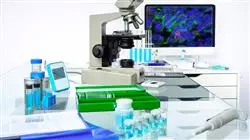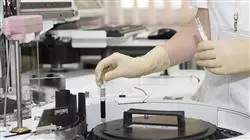University certificate
The world's largest faculty of medicine”
Why study at TECH?
"The goal of health care is to achieve cures for diseases and to provide patients with a better quality of life. Investing in research is important, but so is having specialized professionals"

The Postgraduate diploma in Clinical Trials Monitoring provides students with comprehensive training in the field of clinical research, a key element in the discovery of new drugs to improve the quality of life of patients. A key role in this process is played by the trial monitor, who is responsible for ensuring that the results obtained are reliable.
In this case, the main functions of the sponsor are analyzed, including the design of the protocol on the basis of which the entire clinical trial is developed, and the promoter's responsibility for the "verification of the adequate and effective monitoring of the clinical trial" is evaluated, in order to establish the close relationship between the sponsor and the monitor. As such, it specifies the profile of the monitor and the skills and abilities to ensure the proper functioning of the study within the research center, complying with Good Clinical Practice standards and protocol requirements.
On the other hand, the final part of the clinical trial and the SOPs (Standard Operating Procedures) that the CROs (Clinical Research Organizations) propose to the monitors will also be shown.
In short, a global vision of the monitoring process is presented, so that the healthcare professional will be able to acquire specialized knowledge that will serve as a guide for carrying out this work in a specialized center.
This Postgraduate diploma in Clinical Trials Monitoring will allow you to specialize until you achieve excellence in your profession"
This Postgraduate diploma in Clinical Trials Monitoring contains the most complete and up-to-date scientific program on the market. The most important features include:
- The development of practical case studies presented by experts in Clinical Trials Monitoring
- The graphic, schematic, and practical contents with which they are created, provide scientific and practical information on the disciplines that are essential for professional development
- New developments in Clinical Trials Monitoring
- Practical exercises where self-assessment can be used to improve learning
- Special emphasis on innovative methodologies in Clinical Trials Monitoring
- Theoretical lessons, questions to the expert, debate forums on controversial topics, and individual reflection assignments
- Content that is accessible from any fixed or portable device with an internet connection
This Postgraduate diploma is the best investment you can make when selecting a refresher program to expand your existing knowledge of Clinical Trials Monitoring”
The teaching staff includes professionals from the Health sector, who bring their experience to this training program, as well as renowned specialists from leading societies and prestigious universities.
The multimedia content, developed with the latest educational technology, will provide the professional with situated and contextual learning, i.e., a simulated environment that will provide immersive training programmed to train in real situations.
This program is designed around Problem-Based Learning, whereby the professional must try to solve the different professional practice situations that arise throughout the program. For this purpose, the professor will be assisted by an innovative interactive video system developed by renowned and experienced experts in the field of Monitoring of Clinical Trials.
Do not hesitate to take this training with us. You will find the best teaching material with virtual lessons"

This 100% online Postgraduate diploma will allow you to balance your studies with your professional work while expanding your knowledge in this field"
Syllabus
The structure of the contents has been designed by the best professionals in research and health, with an extensive background and recognized prestige in the profession, backed by the volume of cases reviewed, studied and diagnosed, and with extensive mastery of new technologies.

This Postgraduate diploma in Clinical Trials Monitoring contains the most complete and up-to-date scientific program on the market”
Module 1. Clinical Trials (I)
1.1. Clinical Trials. Fundamental Concepts I
1.1.1. Introduction
1.1.2. Definition of clinical trial (CT)
1.1.3. History of Clinical Trials
1.1.4. Clinical Research
1.1.5. Parties Involved in CTs
1.1.6. Conclusions
1.2. Clinical Trials. Fundamental Concepts II
1.2.1. Standards of Good Clinical Practice
1.2.2. Clinical Trial Protocol and Annexes
1.2.3. Pharmacoeconomic Assessment
1.2.4. Aspects that Could Be Improved in Clinical Trials
1.3. Clinical Trials Classification
1.3.1. Clinical Trials Purpose
1.3.2. Clinical Trials According to the Scope of Research
1.3.3. Clinical Trials Methodology
1.3.4. Treatment Groups
1.3.5. Clinical Trials Masking
1.3.6. Treatment Assignment
1.4. Phase I Clinical Trials
1.4.1. Introduction
1.4.2. Phase I Clinical Trials Characteristics
1.4.3. Phase I Clinical Trials Design
1.4.3.1. Single Dose Trials
1.4.3.2. Multiple Dose Trials
1.4.3.3. Pharmacodynamic Studies
1.4.3.4. Pharmacokinetic Studies
1.4.3.5. Bioavailability and Bioequivalence Studies
1.4.4. Phase I Units
1.4.5. Conclusions
1.5. Non-commercial Research
1.5.1. Introduction
1.5.2. Non-commercial Research
1.5.3. Start-up of Non-commercial Clinical Trials
1.5.4. Difficulties of the Independent Promoter
1.5.5. Promotion of Independent Clinical Research
1.5.6. Application for Grants for Non-commercial Clinical Research
1.5.7. Bibliography
1.6. Equivalence and Non-Inferiority Cts (I)
1.6.1. Equivalence and Non-Inferiority Clinical Trials
1.6.1.1. Introduction
1.6.1.2. Justification
1.6.1.3. Therapeutic Equivalence and Bioequivalence
1.6.1.4. Concept of Therapeutic Equivalence and Non-Inferiority
1.6.1.5. Objectives
1.6.1.6. Basic Statistical Aspects
1.6.1.7. Intermediate Data Tracking
1.6.1.8. Quality of Equivalence and Non-Inferiority RCTs
1.6.1.9. Ethical Aspects
1.6.1.10. Post-Equivalence
1.6.2. Conclusions
1.7. Equivalence and Non-Inferiority CTs (II)
1.7.1. Therapeutic Equivalence in Clinical Practice
1.7.1.1. Level 1: Direct Trials Between 2 Drugs, with Equivalence or Non-Inferiority Design
1.7.1.2. Level 2: Direct Trials Between 2 Drugs, with Statistically Significant Differences, but without Clinical Relevance
1.7.1.3. Level 3: Not Statistically Significant Trials
1.7.1.4. Level 4: Different Trials vs. a Third Common Denominator
1.7.1.5. Level 5: Trials vs. Different Comparators and Observational Studies
1.7.1.6. Supporting Documentation: Reviews, Clinical Practice Guidelines, Recommendations, Expert Opinion, Clinical Judgment
1.7.2. Conclusions
1.8. Guidelines for the Development of a Clinical Trial Protocol
1.8.1. Summary
1.8.2. Index
1.8.3. General Information
1.8.4. Justification
1.8.5. Hypothesis and Objectives of the Trial
1.8.6. Trial Design
1.8.7. Selection and Withdrawal of Subjects
1.8.8. Treatment of Subjects
1.8.9. Efficacy Assessment
1.8.10. Safety Assessment
1.8.10.1. Adverse Events
1.8.10.2. Adverse Events Management
1.8.10.3. Adverse Events Notification
1.8.11. Statistics
1.8.12. Ethical Aspects
1.8.13. Information and Consent
1.8.14. Financing and Insurance
1.8.15. Publication Policy
1.8.16. Conclusions
1.9. Non-Protocol Administrative Aspects of Clinical Trials
1.9.1. Documentation Required for the Start of the Trial
1.9.2. Subject Identification, Recruitment and Selection Records
1.9.3. Source Documents
1.9.4. Data Collection Notebooks (DCNs)
1.9.5. Monitoring
1.9.6. Conclusions
1.10. Data Collection Notebooks (DCNs)
1.10.1. Definition
1.10.2. Function
1.10.3. Importance and Confidentiality
1.10.4. Types of Data Collection Notebooks
1.10.5. Elaboration of the Data Collection Notebook
1.10.5.1. Types of Data
1.10.5.2. Order
1.10.5.3. Graphic Design
1.10.5.4. Filling in the Data
1.10.5.5. Recommendations
1.10.6. Conclusions
Module 2. Monitoring of Clinical Trials (I)
2.1. Promoter I
2.1.1. General Aspects
2.1.2. Promoters Responsibilities
2.2. Promoter II
2.2.1. Project Management
2.2.2. Non-commercial Research
2.3. Protocol
2.3.1. Definition and Content
2.3.2. Protocol Compliance
2.4. Monitoring
2.4.1. Introduction
2.4.2. Definition
2.4.3. Monitoring Objectives
2.4.4. Types of Monitoring: Traditional and Risk-Based
2.5. Clinical Trial Monitor I
2.5.1. Who can be a Monitor?
2.5.2. CRO: Clinical Research Organization
2.5.3. Monitoring Plan
2.6. Clinical Monitor II
2.6.1. Monitors Responsibilities
2.6.2. Verification of Source Documents Source Documents Verification (SDV)
2.6.3. Monitors Report and Monitoring Letter
2.7. Selection Visit
2.7.1. Researcher Selection
2.7.2. Aspects to take into Account
2.7.3. Suitability of Facilities
2.7.4. Visit to other Hospital Services
2.7.5. Deficiencies in Study Facilities and Staffing
2.8. START UP in a Clinical Research Center
2.8.1. Definition and Functionality
2.8.2. Essential Documents at the Beginning of the Trial
2.9. Initiation Visit
2.9.1. Objective
2.9.2. Preparing the Initiation Visit
2.9.3. Investigators File
2.9.4. Investigator Meeting
2.10. Hospital Pharmacy Initiation Visit
2.10.1. Objective
2.10.2. Investigational Drug Management
2.10.3. Temperature Control
2.10.4. General Deviation Procedure
Module 3. Monitoring of Clinical Trials (II)
3.1. Follow-Up Visit
3.1.1. Preparation
3.1.1.1. Letter Confirming the Visit
3.1.1.2. Preparation
3.1.2.Center Development
3.1.2.1. Documentation Review
3.1.2.2. SAEs
3.1.2.3. Inclusion and Exclusion Criteria
3.1.2.4. Collate
3.1.3.Research Team Training
3.1.3.1. Monitoring
3.1.3.1.1. Monitoring Report Preparation
3.1.3.1.2. Issue Tracking
3.1.3.1.3. Team Support
3.1.3.1.4. Monitoring Letter
3.1.3.2. Temperature
3.1.3.2.1. Adequate Medication
3.1.3.2.2. Reception
3.1.3.2.3. Expiration
3.1.3.2.4. Dispensing
3.1.3.2.5. Setting Up
3.1.3.2.6. Return
3.1.3.2.7. Storage
3.1.3.2.8. Documentation
3.1.3.3. Samples
3.1.3.3.1. Local and Central
3.1.3.3.2. Types
3.1.3.3.3. Temperature Registration
3.1.3.3.4. Calibration/Maintenance Certificate
3.1.3.4. Meeting with the Research Team
3.1.3.4.1. Signature of Pending Documentation
3.1.3.4.2. Discussion of Findings
3.1.3.4.3. Re-Training
3.1.3.4.4. Corrective Actions
3.1.3.5. Review of ISF (Investigator Site File)
3.1.3.5.1. Clinical Investigations (CIs) and Protocols
3.1.3.5.2. New Approvals from the Ethics Committee and the AEMPS
3.1.3.5.3. LOGs
3.1.3.5.4. Site Visit Letter
3.1.3.5.5. New Documentation
3.1.3.6. Suspected Unexpected Serious Adverse Reactions (SUSARs)
3.1.3.6.1. Concept
3.1.3.3.2. Principal Investigator Review
3.1.3.7. Electronic Notebook
3.2.Close-Out Visit
3.2.1. Definition
3.2.2. Reasons for Close-Out Visits
3.2.2.1. Completion of the Clinical Trial
3.2.2.2. Not Complying with Protocol
3.2.2.3. Not Complying with Good Clinical Practices
3.2.2.4. At the Investigators Request
3.2.2.5. Low Recruitment
3.2.3. Procedures and Responsibilities
3.2.3.1. Before the Close-Out Visit
3.2.3.2. During the Close-Out Visit
3.2.3.3. After the Close-Out Visit
3.2.4. Pharmacy Close-Out Visit
3.2.5. Final Report
3.2.6. Conclusions
3.3. Queries Management, Database Slicing
3.3.1. Definition
3.3.2. Queries Rules
3.3.3. How are Queries Generated?
3.3.3.1. Automatically
3.3.3.2. By the Monitor
3.3.3.3. By an External Reviewer
3.3.4. When are Queries Generated?
3.3.4.1. After a Monitoring Visit
3.3.4.2. Close to Closing a Database
3.3.5. Query Status
3.3.5.1. Open
3.3.5.2. Pending Revision
3.3.5.3. Closed
3.3.6. Database Slicing
3.3.6.1. Most Frequent Database Slicing Errors
3.3.7. Conclusions
3.4. AE Management and SAE Notification
3.4.1. Definitions
3.4.1.1. Adverse Events “Adverse Event” (AE)
3.4.1.2. Adverse Reactions (AR)
3.4.1.3. Serious Adverse Event (SAE) or Serious Adverse Reaction (SAR).
3.4.1.4. Suspected Unexpected Serious Adverse Reaction (SUSAR) (SUSAR)
3.4.2. Data to be Collected by the Researcher
3.4.3. Collection and Assessment of the Safety Data Obtained in the Clinical Trial
3.4.3.1. Description
3.4.3.2. Dates
3.4.3.3. Unraveling
3.4.3.4. Intensity
3.4.3.5. Actions Taken
3.4.3.6. Causal Relationship
3.4.3.7. Basic Questions
3.4.3.7.1. Who Notifies, What is Notified, Who is Notified, How are they Notified, When are they Notified?
3.4.4. Procedures for the Communication of AE/AR with Investigational Drugs
3.4.4.1. Expedited Notification of Individual Cases
3.4.4.2. Periodic Security Reports
3.4.4.3. “Ad hoc" Security Reports
3.4.4.4. Annual Reports
3.4.5. Special Interest Events
3.4.6. Conclusions
3.5. Clinical Research Associate (CRA) Standard Operating Procedures Standard Operating Procedures (SOP)
3.5.1. Definition and objectives
3.5.2. Writing a SOP
3.5.2.1. Procedure
3.5.2.2. Format
3.5.2.3. Implementation
3.5.2.4. Review
3.5.3. SOP Feasibility and Site Qualification Visit
3.5.3.1 Procedures
3.5.4. SOP Initiation Visit
3.5.4.1. Procedures Prior to the Initiation Visit
3.5.4.2. Procedures During the Initiation Visit
3.5.4.3. Monitoring Initiation Visit Procedures
3.5.5. SOP Monitoring Visit
3.5.5.1. Procedures Prior to the Monitoring Visit
3.5.5.2. Procedures During the Monitoring Visit
3.5.5.3. Monitoring Letter
3.5.6. SOP for Close-Out Visit
3.5.6.1. Preparing the Close-Out Visit
3.5.6.2. Manage the Close-Out Visit
3.5.6.3. Monitoring After a Close-Up Visit
3.5.7. Conclusions
3.6. Quality Guarantee. Audits and Inspections
3.6.1. Definition
3.6.2. Legal Framework
3.6.3. Types of Audits
3.6.3.1. Internal Audits
3.6.3.2. External Audits or Inspections
3.6.4. How to Prepare an Audit?
3.6.5. Principal Findings
3.6.6. Conclusions
3.7. Protocol Deviations
3.7.1. Criteria
3.7.1.1. Non-Compliance with Inclusion Criteria
3.7.1.2. Compliance with Exclusion Criteria
3.7.2. International Classification of Functioning (ICF) Deficiencies
3.7.2.1. Correct Signatures on Documents (CI, LOG)
3.7.2.2. Correct Dates
3.7.2.3. Correct Documentation
3.7.2.4. Correct Storage
3.7.2.5. Correct Version
3.7.3. Out-Of-Window Visits
3.7.4. Poor or Wrong Documentation
3.7.5. The 5 Rights Medication Administration
3.7.5.1. Right Patient
3.7.5.2. Right Drug
3.7.5.3. Right Time
3.7.5.4. Right Dose
3.7.5.5. Right Route
3.7.6. Missing Samples and Parameters
3.7.6.1. Missing Samples
3.7.6.2. Parameter Not Performed
3.7.6.3. Sample Not Sent On Time
3.7.6.4. Time of Sample Collection
3.7.6.6. Request for Kits Out of Time
3.7.7. Information Privacy
3.7.7.1. Information Security
3.7.7.2. Reporting Security
3.7.7.3. Photo Security
3.7.8. Temperature Deviations
3.7.8.1. Register
3.7.8.2. Inform.
3.7.8.3. Act
3.7.9. Open Blinding at the Wrong Time
3.7.10. PI Availability
3.7.10.1. Not Updated in Interactive Voice Response Services (IVRS)
3.7.10.2. Not Sent on Time
3.7.10.3. Not Registered on Time
3.7.10.4. Broken Stock
3.7.11. Forbidden Medication
3.7.12. Key and Non-Key
3.8. Source and Essential Documents
3.8.1. Features
3.8.2. Source Documents Location
3.8.3. Source Document Access
3.8.4. Source Document Types
3.8.5. How to Correct a Source Document?
3.8.6. Source Document Retention Time
3.8.7. Main Components of the Medical History
3.8.8. Investigator's Brochure (IB)
3.9. Monitoring Plan
3.9.1. Visits
3.9.2. Frequency
3.9.3. Organization
3.9.4. Confirmation
3.9.5. Site Issues Categorization
3.9.6. Communication with Researchers
3.9.7. Research Team Training
3.9.8. Trial Master File
3.9.9. Reference Documents
3.9.10. Electronic Notebooks Remote Review
3.9.11. Data Privacy
3.9.12. Center Management Activities
3.10. Data Collection Notebooks
3.10.1. Concept and History
3.10.2. Timeline Compliance
3.10.3. Data Validation
3.10.4. Management of Data Inconsistencies or Queries
3.10.5. Data Exports
3.10.6. Security and Roles
3.10.7. Traceability and Logs
3.10.8. Report Generation
3.10.9. Notifications and Alerts
3.10.10. Electronic Notebook vs. Paper Notebook

This will provide key training to advance your career"
Postgraduate Diploma in Monitoring of Clinical Trials
The Postgraduate Diploma in Clinical Trial Monitoring is a program designed to train students in the field of clinical research, which is essential to achieve the discovery of new drugs that will improve the quality of life of patients. In this process, the trial monitor plays a fundamental role, in charge of ensuring that the results obtained are reliable and comply with the standards of Good Clinical Practice and protocol requirements. The program of studies analyzes the main functions of the sponsor, responsible for the design of the protocol from which the entire clinical trial is developed, and evaluates his/her responsibility for the "verification of the adequate and effective monitoring of the clinical trial". In this way, a close relationship is established between the sponsor and the monitor, and the profile of the monitor and the skills and abilities necessary to ensure the proper functioning of the study within the research center are specified.
In-depth study of clinical trial protocols
Students will learn about the processes and tools necessary to carry out an effective monitoring of clinical trials, from the selection and training of investigators to the follow-up and evaluation of the data obtained. Key aspects such as the management of adverse events and the resolution of problems and conflicts that may arise during the clinical trial are also addressed.Mastering clinical trial monitoring is essential for any health professional who wants to develop their career in the field of clinical research. This program provides students with comprehensive training in this field, with the objective of enabling them to carry out effective monitoring and ensure the reliability of the results obtained.







